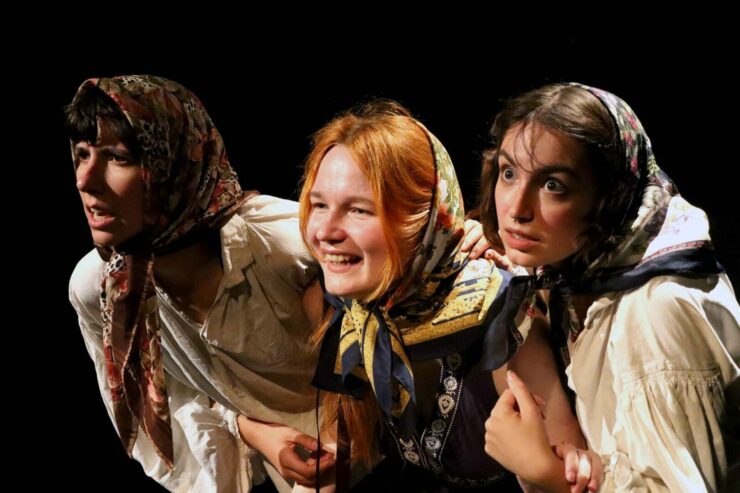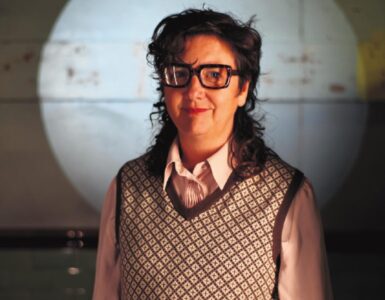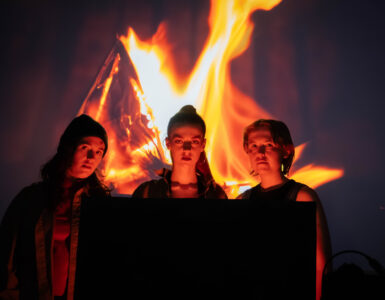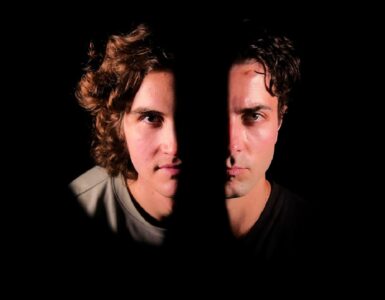A mythified exploration of the real-life experiences of Eastern European immigrants in the UK, examining identity, queerness and migrant joy, is the offering from Transit Productions at this year’s Springboard Festival. Taking centre stage at Applecart Arts in East London, the piece has been put together by a group of multi-disciplinary performers utilising traditional storytelling, song, movement, and puppetry to put migrant stories in the spotlight.
We sat down for a pixelated pint with deviser-performers Billie Hewitt-Pavlica, Rebeka Dio, and Irina Anghel to get to know the all about the show’s joy, playfulness, and intersectionality.
You can catch Places I Never Think About at Applecart Arts from February 17th-18th at 17:00 and 13:00 respectively. Tickets are available through the Applecart Arts website.
Jake: Hey team! You’ve put together Places I Never Think About which you’re describing as a ‘myth-ified’ exploration of the real-life experiences of Eastern European migrants in the UK. Tell us what myth means to you and how it’s expressed in the piece.
Billie: Myths to me are interesting and really important, especially in relation to Croatian myths or myths from ex-Yugoslavia. A lot of that mythology is connected to paganism and it’s something that isn’t widespread anymore. I’ve been working a lot with myths and it’s a way for me to reconnect to something that I feel has been lost, especially because there is little else from home that I feel particularly connected to.
In the show, I’m particular excited to play a Rusalka, who is a villainised mythological creature and is your typical Eastern European version of an evil siren who likes to lure men to their deaths for no particular reason. In this performance, we get to queer her in a way that helps me connect that story to my experience as a queer performer.
Jake: The piece takes on the lens of queerness, identity, and ‘migrant joy’. Tell us what spurred you to create the piece and how the process has been of bringing those elements together.
Rebeka: The process began with conversations, and a deep sense of frustration at not seeing any Eastern European representation on stage, especially ones that reflected my experience or those of people around me. We are such a large community in the UK, and there’s not much theatre or media that speaks to us or aims to connect us to each other. I wanted to counter that feeling of isolation with joy. I think joy is very powerful, especially for people that have faced so much adversity through immigration or in our collective past.
Through this process, we’ve gathered a team of queer devisers & artists from Eastern Europe who are passionate to tell their stories and explore the same topics.
Jake: You use live music, traditional storytelling, and puppetry in the piece. Tell us what the audience can expect as a live theatrical experience.
Irina: The audience can expect a wide variety of things. We have a lot of music both acapella and instrumental. We have traditional folk music. We have a bit of puppetry. We have a bit of storytelling. It’s a show for all ages that explores all types of playful methods of getting a story across, reminiscent of the old traditions of street theatre and puppet theatre from our home countries.
Jake: Tell us about your relationship with Springboard Festival and Applecart Arts – and how are you feeling about it all now it’s so close?
Rebeka: It’s really exciting to be part of a brand new festival that champions new and devised work. I live in the same area as Applecart Arts and it’s great to see how they engage and work closely with the local community. This area has a very high population of Eastern European immigrants, and we want to reach out to them. We’ve made one of our shows a Babes-in-Arms performance because we know there are lots of parents around and we don’t want that to become a barrier. Applecart has been so supportive in organising all of this.
Jake: Given the themes of Binge Fringe, if your show was a beverage of any kind (alcoholic, non-alcoholic – be as creative as you like!), what would it be and why?
Irina: It would have to be Palinka, which is a type of very strong fruit brandy that can be found all over Eastern Europe and is usually consumed in a shot form. Any sort of celebration can be an excuse for palinka. In Romania it can be seen as a welcoming gift from the host who would offer it to guests upon first entering the house. Our show is very similar; we’re welcoming audiences into this world that we’ve created and giving them a strong shot of sensation with music, stories, dance, and it’s done before you know it.









